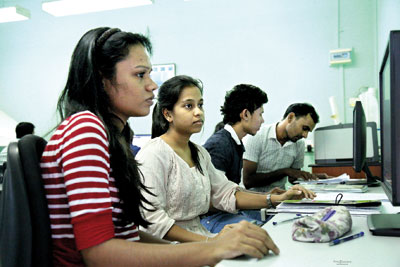Sri Lanka Institute of Textile & Apparel – The destination for a brighter future
View(s):Global market place for the apparel industry is in a constant state of flux, and the customer demand is constantly changing and evolving every day. Up until now, being a small island, Sri Lanka has faced these transformations successfully, especially, because the apparel industry of the country has proven to be proactive, helping the sustainability of the Sri Lankan economy.
 With a massive workforce of over 560,000, and a GDP contribution of 6%, apparel and textile industry is one of Sri Lanka’s key industries, giving us global recognition as an apparel hub, and opening thousands of entrepreneurship and industrial job opportunities worldwide.
With a massive workforce of over 560,000, and a GDP contribution of 6%, apparel and textile industry is one of Sri Lanka’s key industries, giving us global recognition as an apparel hub, and opening thousands of entrepreneurship and industrial job opportunities worldwide.
What is SLITA?
Sri Lanka Institute of Textile & Apparel, or SLITA, provides quality, fast track, and innovative education, from school leavers to the professionals, with the ambition of catering to the needs of the textile and apparel industry.
Established in the year 2009, under the provisioning Act No.12 of 2009, by merging Clothing Industry Training Institute and Textile Training & Services Centre, SLITA operates as a self-sustained entity, under the Ministry of Industry and Commerce. With the vision, ‘to be an internationally renowned Training and Technical Service Provider for the Textile & Apparel Industry’, SLITA offers its core business solutions to ensure the sustainability of Textile and Apparel Industry, both on national and international levels. But, most importantly, the institute stays true to its mission of facilitating the Sustainable Development of Sri Lankan Textile & Apparel Industry, by Producing Competent workforce with Specialized Skills.
The purpose and vision
Even though, Sri Lanka is one of the top apparel and textile producers in the world, with a well established export market, the industry has faced the challenge of lack of qualified and skilled human resources. With a number of job opportunities opening in different areas, including in the management level, nearly one million direct and indirect employment vacancies are expected as skilled manpower. SLITA offers the best solution to minimize this obstacle in the textile industry, by guiding right people, with right abilities to the right place, at the right time.
SLITA has organized training programs, which fulfill the job expectations of school leavers, and the school dropouts of the different stages of schooling. Apart from the employment-based training conducted by the institute, SLITA also conducts Diploma level education, training and consultancy and technical services to those in the Textile & Apparel Industry, and plans are afoot to initiate degree programmes, in the immediate future.
The ideal destination
Hence, it is one of the best destinations for anyone, with the interest in the industry, for it guarantees a positive development in both knowledge and skill. Mr Robert V. Peries, the Director General of SLITA, shared his views about the institute saying, “The students are poised to get a unique experience, having the industrial and institutional exposure, besides the regular academic work. The institute leadership and the distinguished group of faculty members are geared to offer education, bench marking the other similar institutions in all major areas of textile, apparel technology and management. Now,, the Institution is linking with other international academic Institutions for the mutual co-operation to offer higher level of courses/ training programmes. Institute plays a significant role in national economic development, through its services, facilitating a new entrance for the industrialists in the textile and apparel sector.”
As the number one solution provider for the demand of skilled labour in the industry, Sri Lanka Institute of Textile & Apparel offers a number of Diploma level, Certificate level and Short-Term courses under the departments of Engineering, Textile Technology, Product Development, Leather and Footwear, Clothing Technology, and Testing and Quality Assurance . Students after their A/L’s can join the institute, for a suitable Diploma programme in SLITA, that would be a pre-qualification to a Degree programme in any recognised university, in the world.
Professional qualifications and industrial needs
With 40% practical-based curriculum, harnessed with wide exposure to latest technological developments, and in well-equipped laboratories, SLITA offers the best professional qualifications, that will meet the increasing global challenges. The institute conducts industry focused, productivity improvement programmes, such as SME Skill Development, Woman Empowerment and Skill Development, Entrepreneur Development, Cottage Industry Development, Mini-Apparel Development, Career Development Programmes and much more.
Expressing ideas on the topic, chairman of SLITA, Mr. M A Thajudeen opines, “The institute is geared to train both school leavers and industry personnel, in various disciplines, according to the industry demand. It is a great pleasure to mention that, those who obtain training and other services in various specialties are in heavy demand, and they, surely, measure up to the expectations of the industry requirements”
Challenges and future development
Having a strong reputation as a sustainable and ethical manufacturing destination, the apparel and textile industry of Sri Lanka, still needs to adapt to the changing needs of the customer. This is why, the industry needs creative minds, entrepreneurs, and manufacturing and technical experts, with strategic orientations in thinking. Problems and challenges, offer opportunities for new innovations, and it will also inspire people to make a difference.
To make it up to these challenges, the Sri Lanka Institute of Textile & Apparel has enhanced the overall performance, and, as a result, SME skilled development programmes are aiming at developing the capabilities, and capacities of the human resources demanded of the industry, to meet challenges to go global.
As a training institution SLITA offers quality facilities and services, both locally and internationally. It also provides, great opportunities for interested individuals, and helps them by broadening the horizons of knowledge, skills, and employment opportunities to gain recognition, crossing the boundaries of Sri Lanka.
- Thishana M. Rajanayake.


